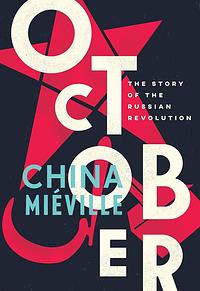Take a photo of a barcode or cover
hopeful
informative
inspiring
tense
medium-paced
I am not an expert on the Russian Revolutions of 1917, so I can't speak to the accuracy of China's representation of facts. I can, however, tell you that the information in this book is presented as an absolutely gripping narrative in a way that many other history books I've read are not. Be forewarned that the author hasn't discarded his flowery and archaic language for the sake of history, but it is slightly toned down compared to his fiction.
There is a clear, albeit slight, bias here, which is acknowledged in the book's opening: the author is ultimately on the side of the Bolshevik revolutionaries. Does that mean that they get off scot-free? Of course not. The post-October actions of the regime are especially excoriated in the book's epilogue. Ultimately though, this is a story about hope, about a desire to change the world for the better, and for a brief reality the Russian left seems to have genuinely believed that they could.
One other small note for those, like me, who aren't familiar with Russian names: make use of the included glossary of names. I found myself confusing people pretty often. It may also be helpful to make or find yourself a chart of the various committees, congresses, councils, and other organizations mentioned throughout this story, because there are a lot. If there's one thing socialists seem to love, it's forming committees.
There is a clear, albeit slight, bias here, which is acknowledged in the book's opening: the author is ultimately on the side of the Bolshevik revolutionaries. Does that mean that they get off scot-free? Of course not. The post-October actions of the regime are especially excoriated in the book's epilogue. Ultimately though, this is a story about hope, about a desire to change the world for the better, and for a brief reality the Russian left seems to have genuinely believed that they could.
One other small note for those, like me, who aren't familiar with Russian names: make use of the included glossary of names. I found myself confusing people pretty often. It may also be helpful to make or find yourself a chart of the various committees, congresses, councils, and other organizations mentioned throughout this story, because there are a lot. If there's one thing socialists seem to love, it's forming committees.
challenging
informative
medium-paced
Παρά το γεγονός ότι τον Miéville τον γνωρίσαμε και τον αγαπήσαμε για τη γόνιμη φαντασία του και την εξαιρετική ικανότητά του να την περνάει στο χαρτί, εδώ τα πράγματα είναι διαφορετικά...
Ο "Οκτώβρης" (παρά το γεγονός ότι περιέχει ελάχιστο "Οκτώβρη" κι αυτόν στο τέλος), είναι ένα πολύ καλογραμμένο "οδοιπορικό" της Ρωσικής περιόδου πολιτικής αναταραχής που οδήγησε στην Οκτωβριανή Επανάσταση του 1917, την πρώτη Σοσιαλιστική Επανάσταση (και την οριστική πτώση της δυναστείας των Ρομανόφ που κρατούσε τη χώρα σε ημι-φεουδαλική κατάσταση).
Χωρίς να περιορίζεται στα γεγονότα του 1917 (ξεκινάει από νωρίτερα, περιλαμβάνοντας το 1883 και το 1905 μεταξύ άλλων) και καταγράφει με ελαφρώς μυθιστορηματικό τρόπο αλλά χωρίς ποτέ να ξεφεύγει από την ιστορική νηφαλιότητα, τα πρόσωπα και τις καταστάσεις που ξεχωρίζουν στους ταραγμένους εκείνους καιρούς, ακόμη και περσόνες που η ιστορία έχει καταδικάσει σε υποσημειώσεις, χωρίς να στήνει αδριάντες και χωρίς να υπερτονίζει ρόλους, με ματιά διεισδυτική και κριτική, αν και δύσκολα θα μπορούσε να το χαρακτηρίσει κανείς "επιστημονικό" ιστορικό πόνημα, ωστόσο είναι ένα χρήσιμο "εναρκτήριο" βήμα για όσους θέλουν να ασχοληθούν με την ιστορία της σοβιετικής ένωσης γενικότερα και της επανάστασης του 1917 ειδικότερα.
Πέρα από την ίδια την ιστορία που καταγράφει, ο συγγραφέας θέτει και μερικά πολύ χρήσιμα ερωτήματα στο τέλος του βιβλίου, σημαντικότερο απ' όλα για μένα το εξής: "Ο Οκτώβρης ήταν αναπόδραστο να οδηγήσει στον Στάλιν; Είναι τα γκουλάγκ εξέλιξη του 1917;", ερωτήματα που συνήθως προκαλούν εκρήξεις αναφυλαξίας σε Σταλινοφρουρούς και οπαδούς του μονολιθικού δυσλειτουργικού μοντέλου του ανελεύθερου μονοκομματικού κράτους τρόμου, αστυνόμευσης και παράνοιας που επικράτησε μετά το θάνατο του Λένιν και του διωγμού του Τρότσκι.
Σίγουρα αξίζει να διαβαστεί και σίγουρα αξίζει κανείς να ψαχτεί μετά από πλευράς βιβλιογραφίας.
Ο "Οκτώβρης" (παρά το γεγονός ότι περιέχει ελάχιστο "Οκτώβρη" κι αυτόν στο τέλος), είναι ένα πολύ καλογραμμένο "οδοιπορικό" της Ρωσικής περιόδου πολιτικής αναταραχής που οδήγησε στην Οκτωβριανή Επανάσταση του 1917, την πρώτη Σοσιαλιστική Επανάσταση (και την οριστική πτώση της δυναστείας των Ρομανόφ που κρατούσε τη χώρα σε ημι-φεουδαλική κατάσταση).
Χωρίς να περιορίζεται στα γεγονότα του 1917 (ξεκινάει από νωρίτερα, περιλαμβάνοντας το 1883 και το 1905 μεταξύ άλλων) και καταγράφει με ελαφρώς μυθιστορηματικό τρόπο αλλά χωρίς ποτέ να ξεφεύγει από την ιστορική νηφαλιότητα, τα πρόσωπα και τις καταστάσεις που ξεχωρίζουν στους ταραγμένους εκείνους καιρούς, ακόμη και περσόνες που η ιστορία έχει καταδικάσει σε υποσημειώσεις, χωρίς να στήνει αδριάντες και χωρίς να υπερτονίζει ρόλους, με ματιά διεισδυτική και κριτική, αν και δύσκολα θα μπορούσε να το χαρακτηρίσει κανείς "επιστημονικό" ιστορικό πόνημα, ωστόσο είναι ένα χρήσιμο "εναρκτήριο" βήμα για όσους θέλουν να ασχοληθούν με την ιστορία της σοβιετικής ένωσης γενικότερα και της επανάστασης του 1917 ειδικότερα.
Πέρα από την ίδια την ιστορία που καταγράφει, ο συγγραφέας θέτει και μερικά πολύ χρήσιμα ερωτήματα στο τέλος του βιβλίου, σημαντικότερο απ' όλα για μένα το εξής: "Ο Οκτώβρης ήταν αναπόδραστο να οδηγήσει στον Στάλιν; Είναι τα γκουλάγκ εξέλιξη του 1917;", ερωτήματα που συνήθως προκαλούν εκρήξεις αναφυλαξίας σε Σταλινοφρουρούς και οπαδούς του μονολιθικού δυσλειτουργικού μοντέλου του ανελεύθερου μονοκομματικού κράτους τρόμου, αστυνόμευσης και παράνοιας που επικράτησε μετά το θάνατο του Λένιν και του διωγμού του Τρότσκι.
Σίγουρα αξίζει να διαβαστεί και σίγουρα αξίζει κανείς να ψαχτεί μετά από πλευράς βιβλιογραφίας.
It was ok, wanted to like this more than I did :(
Ultimately maybe not my style of history reading, think I was wanting more of a broader history & analysis of the historical & social forces, rather than an event-driven play by play.
Ultimately maybe not my style of history reading, think I was wanting more of a broader history & analysis of the historical & social forces, rather than an event-driven play by play.
I wanted to like this more than I did but it didn't quite work for me. It was a bit confused and often felt like it was too densely packed with names and certain repeating ideas.
It didn't help that he kept using anarchy to mean violence and looting etc.
It didn't help that he kept using anarchy to mean violence and looting etc.
I enjoyed some of Mieville’s fiction, so I was excited when I heard about this book, a nonfiction account of the period between the overthrow of the Tsar in February 1917 through the October revolution 8 months later. The book, while fine, did not read like a novel as much as I expected. Although I did like it and learned a bit, it was less fun to read than I expected.
A thorough and wholesale description of everything surrounding the Russian Revolution of 1917. This is also, however, also it's greatest flaw: it is almost too full of names, information, plots and places that it's really hard to follow for those without much prior knowledge about the people involved. Although I've without a doubt learned a lot from this book - which is, by the way, remarkably well written - its narrative approach to history gets in its own way if you aren't adequately prepared for it. I still recommend it, but would really advise you to prepare for it.
challenging
informative
reflective
slow-paced
hopeful
informative
inspiring
reflective
medium-paced
hopeful
informative
inspiring
medium-paced




